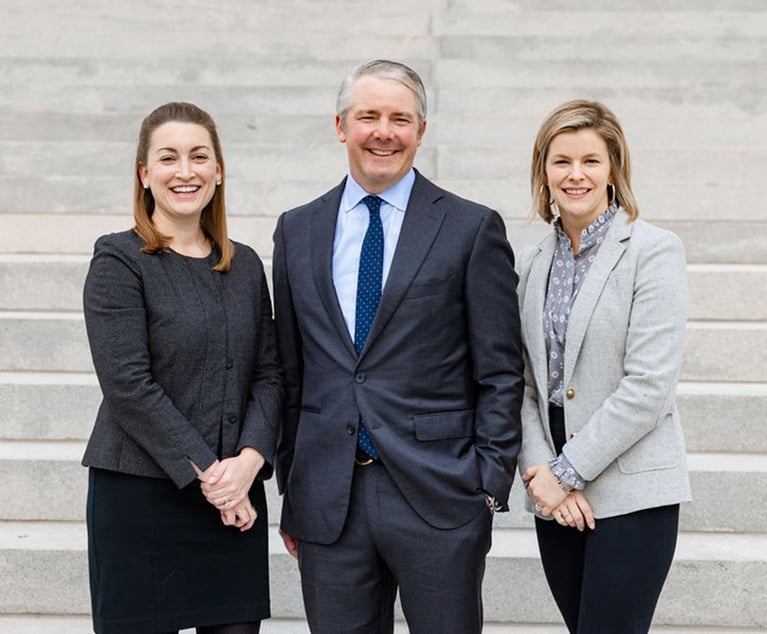Bananas for Breakfast … And More Advice for SCOTUS Advocates
At a recent Harvard Law School panel discussion on appellate advocacy that included Chief Justice John Roberts Jr., Topic A was how to prepare for and survive oral argument at the U.S. Supreme Court.
December 01, 2017 at 04:41 PM
5 minute read

At a recent Harvard Law School panel discussion on appellate advocacy that included Chief Justice John Roberts Jr., Topic A was how to prepare for and survive oral argument at the U.S. Supreme Court.
Advice ranged from writing out and repeating your first sentence—you might not get to say anything else before being interrupted—to wearing the same pearls to every argument, and eating fish the night before and bananas the morning of oral argument. Yes, lots of bananas.
“I do think that food rituals are very important,” said Elizabeth Prelogar, an assistant to the U.S. solicitor general who has been detailed to help special counsel Robert Mueller. “I have the same dinner before every oral argument. I eat salmon, which is a super food, it's good for your brain. In the morning of, I eat bananas—a lot of bananas like two, three, sometimes four. It's the only thing I can stomach with all the anxiety, but it gives me hopefully a good grounding for the argument.”
Other words of appellate wisdom:
Be Fair to the Case: Roberts, who argued 39 cases before becoming a judge, urged advocates not to overstate their case at argument. “It's uncomfortable if you're a judge and one side comes in and says, 'This is absolutely clear, only an idiot would think otherwise,' and the other side says the same thing. Because you're thinking, 'Well I'm an idiot one way or the other.' If you can be fair to the case and not take an immediately extreme position, I always like it when lawyers give something up when they should. There was one time we had recently where one of my colleagues asked about a case, and the lawyer says, 'I was hoping you wouldn't ask about that case,' which is a very refreshing reply.”
Talk It Through: “I do a ton of talking,” Prelogar said. “I talk out loud to myself in my office with the door shut so no one thinks I'm crazy and I just process the case. I think about all of the questions and then I don't want to rehearse actual wording for answers, but I feel that talking out loud and trying to actually articulate the points helps me focus on which ones are going to be most persuasive. … The fact is that if I've got three good points I want to make, usually I'm only going to have a chance to get one of them out in response to a question before the argument veers off course and I get asked something entirely different.”
 Get Ready to Improvise: “The essence of preparation is to be prepared to improvise,” said Kathleen Sullivan, partner at Quinn Emanuel Urquhart & Sullivan. “I've often likened an oral argument to jazz, if you're a music aficionado. There's a lot of preparation that goes into that conversation between the instruments. But once it's happening, it has to be somewhat spontaneous.”
Get Ready to Improvise: “The essence of preparation is to be prepared to improvise,” said Kathleen Sullivan, partner at Quinn Emanuel Urquhart & Sullivan. “I've often likened an oral argument to jazz, if you're a music aficionado. There's a lot of preparation that goes into that conversation between the instruments. But once it's happening, it has to be somewhat spontaneous.”
But Also, Stick to Rituals: “My rituals are all about preparing questions and answers,” Sullivan said. “Do moot courts with colleagues including colleagues who are not familiar with the case so that you can try out your questions and answers. Then I go back and I rewrite the answers after each moot court write the questions, write the answers, and try to make everything shorter and shorter and shorter. … Write out your first sentence. … Repeat that a lot. Of course, you must always have the same meal, you must always stay at the same hotel and you must always wear the same suit, the same pearls until the suit wears out. … Fish the night before and bananas in the morning. Doesn't everybody?”
It's a Conversation: “It was a remarkable revelation when you step to the lectern in the Supreme Court as I did for the first time when I was 34, and the justices are right in front of you at eye level, not more than a few feet away,” said Lawrence Robbins, partner at Robbins, Russell, Englert, Orseck, Untereiner & Sauber. “It lends itself to … the word 'conversation.' It lends itself to the feeling, oddly enough, of informality. Now of course, you don't handle it informally. If you think of it as a conversation where your job is to help the court and help the members and answer their question and not be wedded to the points you think are necessarily the most important … I think that's the beginning of the right way to do this.”
Stay Calm: Said Prelogar, “I was in the courtroom one day, not arguing myself, thankfully, when an individual stood up and started protesting in the middle of the argument. … It was startling because the court is such a solemn place, a quiet place, but what really stood out about it to me was that the advocates who were arguing were not thrown off kilter at all. They had perfect grace in the light of that surprising circumstance and picked right up with the argument. It really was a learning experience for me to see that no matter what's thrown at you, whether it's something from the bench or in the audience, you can have composure.”
This content has been archived. It is available through our partners, LexisNexis® and Bloomberg Law.
To view this content, please continue to their sites.
Not a Lexis Subscriber?
Subscribe Now
Not a Bloomberg Law Subscriber?
Subscribe Now
NOT FOR REPRINT
© 2025 ALM Global, LLC, All Rights Reserved. Request academic re-use from www.copyright.com. All other uses, submit a request to [email protected]. For more information visit Asset & Logo Licensing.
You Might Like
View All
‘Issue of First Impression’: New York Judge Clears Coinbase Appeal Amid Crypto Regulatory Clash
4 minute read
DC's Birchstone Moore Combines With Chicago-Founded Wealth Planning Firm
3 minute read

Trending Stories
- 1Courts, Lawyers Press On With Business as SoCal Wildfires Rage
- 2Florida, a Political Epicenter, Is the Site of Brownstein Hyatt's 13th Office
- 3Law Firms Close Southern California Offices Amid Devastating Wildfires
- 4Lawsuit alleges racial and gender discrimination led to an Air Force contractor's death at California airfield
- 5Holland & Knight Picks Up 8 Private Wealth Lawyers in Los Angeles
Who Got The Work
Michael G. Bongiorno, Andrew Scott Dulberg and Elizabeth E. Driscoll from Wilmer Cutler Pickering Hale and Dorr have stepped in to represent Symbotic Inc., an A.I.-enabled technology platform that focuses on increasing supply chain efficiency, and other defendants in a pending shareholder derivative lawsuit. The case, filed Oct. 2 in Massachusetts District Court by the Brown Law Firm on behalf of Stephen Austen, accuses certain officers and directors of misleading investors in regard to Symbotic's potential for margin growth by failing to disclose that the company was not equipped to timely deploy its systems or manage expenses through project delays. The case, assigned to U.S. District Judge Nathaniel M. Gorton, is 1:24-cv-12522, Austen v. Cohen et al.
Who Got The Work
Edmund Polubinski and Marie Killmond of Davis Polk & Wardwell have entered appearances for data platform software development company MongoDB and other defendants in a pending shareholder derivative lawsuit. The action, filed Oct. 7 in New York Southern District Court by the Brown Law Firm, accuses the company's directors and/or officers of falsely expressing confidence in the company’s restructuring of its sales incentive plan and downplaying the severity of decreases in its upfront commitments. The case is 1:24-cv-07594, Roy v. Ittycheria et al.
Who Got The Work
Amy O. Bruchs and Kurt F. Ellison of Michael Best & Friedrich have entered appearances for Epic Systems Corp. in a pending employment discrimination lawsuit. The suit was filed Sept. 7 in Wisconsin Western District Court by Levine Eisberner LLC and Siri & Glimstad on behalf of a project manager who claims that he was wrongfully terminated after applying for a religious exemption to the defendant's COVID-19 vaccine mandate. The case, assigned to U.S. Magistrate Judge Anita Marie Boor, is 3:24-cv-00630, Secker, Nathan v. Epic Systems Corporation.
Who Got The Work
David X. Sullivan, Thomas J. Finn and Gregory A. Hall from McCarter & English have entered appearances for Sunrun Installation Services in a pending civil rights lawsuit. The complaint was filed Sept. 4 in Connecticut District Court by attorney Robert M. Berke on behalf of former employee George Edward Steins, who was arrested and charged with employing an unregistered home improvement salesperson. The complaint alleges that had Sunrun informed the Connecticut Department of Consumer Protection that the plaintiff's employment had ended in 2017 and that he no longer held Sunrun's home improvement contractor license, he would not have been hit with charges, which were dismissed in May 2024. The case, assigned to U.S. District Judge Jeffrey A. Meyer, is 3:24-cv-01423, Steins v. Sunrun, Inc. et al.
Who Got The Work
Greenberg Traurig shareholder Joshua L. Raskin has entered an appearance for boohoo.com UK Ltd. in a pending patent infringement lawsuit. The suit, filed Sept. 3 in Texas Eastern District Court by Rozier Hardt McDonough on behalf of Alto Dynamics, asserts five patents related to an online shopping platform. The case, assigned to U.S. District Judge Rodney Gilstrap, is 2:24-cv-00719, Alto Dynamics, LLC v. boohoo.com UK Limited.
Featured Firms
Law Offices of Gary Martin Hays & Associates, P.C.
(470) 294-1674
Law Offices of Mark E. Salomone
(857) 444-6468
Smith & Hassler
(713) 739-1250










